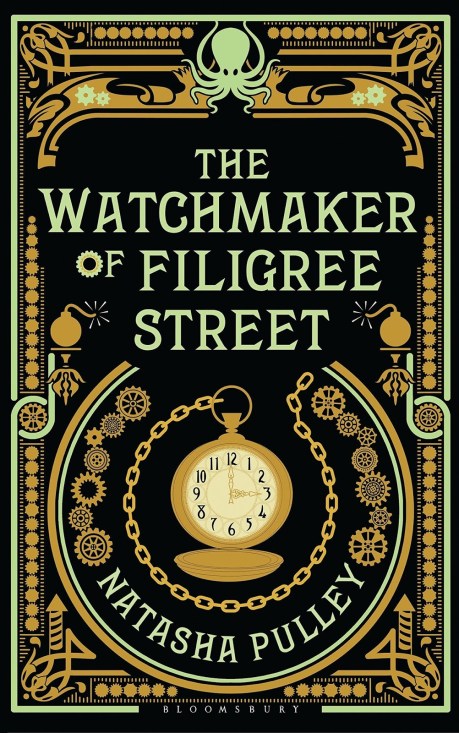
Natasha Pulley is Bath Spa’s very own bestselling author and Creative Writing lecturer. Her debut novel, The Watchmaker of Filigree Street, won a Betty Trask Award and was shortlisted for the Authors’ Club Best First Novel Award. The Bedlam Stacks is Natasha’s second novel, with three more currently in the works. Aaron Sancha spoke to her about her career.
The Watchmaker of Filigree Street is an atmospheric narrative that follows Thaniel Steepleton as he meets Keita Mori, a kindly Japanese gentleman with a secret to hide. This atmospheric narrative not only takes us through Victorian London, it also shows is Japan’s long-standing traditions crumbling because of a civil war.
Natasha’s second novel, The Bedlam Stacks is the story of ex-East India Company smuggler Merrick Tremayne risking his life in search of quinine – essential for the treatment of malaria. He travels deep into Peru, where he meets Raphael, the young priest who seems to have known Merrick’s grandfather, who visited Peru many decades before.
After graduating from Oxford University with an English Literature degree, and working at Cambridge University Press as a publishing assistant in the astronomy and maths departments, Natasha did the Creative Writing MA at the University of East Anglia. She spent nineteen months in Tokyo on a scholarship from the Daiwa Anglo–Japanese Foundation.
As a Bath Spa Creative Writing student and fan of Natasha’s writing, I jumped at the opportunity to interview her. Below, we find out what Natasha was like as a kid, what she used to read, and what the author life has shaped up to be for her.
What were you like as a kid? What books did you read?
I was quite a strange kid. I was a compulsive liar. I got in trouble a lot. My mom couldn’t stand it. I even once told everyone in my class that she was pregnant when she wasn’t. It was really weird and creepy [laughs]. Now I tell the lies on a Microsoft word document, instead of to you guys.
I read all the time. I used to love the Redwall Books, by Brian Jacques. I read the Windsinger series. I loved anything that was odd, anything that was fantastical.
What were your first experiences of writing?
I wrote when I was very little and I remember making up an alphabet and just covering reams of paper with it everywhere. I also wrote Star Trek fan-fiction (Voyager) when I was like ten or eleven. Then off the back of that I would write weird fantasies. They had typical high fantasy aspects, like elves, but then with weird twists.

What motivates you to write? What is your chosen form of procrastination?
Motivation – I think – is a word people use when they have none. There’s nothing that motivates me to write. I just do it. It’s as relaxing as watching TV except that I have more control over it. When I’m writing, nine out of ten times there is no massive brain power behind it. The brain power comes at the editing stage, where everything has to knit together really well. When I’m writing a story on a blank document it is normally just images I like. Then I go: ‘Ah, that’s cool. None of it makes sense… probably should link it up in some way…’ [laughs]
As for forms of procrastination. I have actually very few, I am really boring. The other day I was like: ‘I should go dancing… or just stay at home and read this’. Writing is a form of procrastination for me. Otherwise it’s watching TV, like everything on Netflix and Amazon.
Now that you have dealt with publishers and editors, has your writing process changed?
It hasn’t changed the way I write, but it has changed the way I approach things. That pressure to deliver a perfect story in the first chronologically finished draft is useless. Of course that’s not going to happen. You go through at least three drafts before your editor sees it at all. From the very germ of the idea set aside three years to let it ferment and rest and soak in all the stuff that it needs to soak in. Otherwise you’ll hand in something that is formless and not very good. It’s about recognising how long the process takes and the steps that it must take.
Do you ever discuss your work with your friends?
I have a friend in Bristol that I usually go crying to. Having a conversation about your writing is often a lot more useful than workshopping something, because you can tell them what you want it to be, instead of just showing them what it is, which is usually drastically different from what you wanted. [laughs]
How are you finding the ‘public’ side of the job?
I actually really like it. There is this preconception that writers are all introverts, but I actually really need that social element. It is true that the job tends to be six months of solitary writing and then six months of talking to people, so it balances out but it’s kind of strange. The first few months it’s really difficult because by the time the book is published you haven’t touched it for about five months, so you have already moved on to new projects. People ask me about Japan and I want to talk to them about Peru. [laughs]
You weave magic into your stories very seamlessly. What is the most magical place you have ever been to?
Cornwall. One, I hate reservoirs. Standing next to the one in Cornwall made me feel like it was wrong to stand there. They really give me the creeps, because it’s this huge body of water but it’s man-made. Standing next to them is very strange. They are often very quiet, a lot quieter than a normal lake. I don’t even know how deep they can go.
The other place is Tintagel. The myth is that King Arthur was born there. It’s really lovely, it’s very steep but you can also go down the cliff and at the bottom, kind of hidden, there is this amazing waterfall and no one knows it’s there! It’s this amazing thing, it feels like that kind of place that convinces you of the myth. I really like Cornwall for that, because it’s full of little pockets of weird.

What advice would you give to writers terrified of going out and trying to get their book published?
First of all, you need to get an agent. It is really impossible nowadays to deal with a publishing house without an agent. Go to things like the London Book fair and pitch to agents. You will only have about ten minutes to talk to them. And the way to do that is to have a really concise, confident logline. When you’re pitching you have to be ruthless with yourself and not over-explain. If your logline is good, they will ask more questions. Test your logline out with your friends, people who don’t know about your idea. Have it make sense. And if they ask you to send it to them, make sure it looks professional. If they remember you, which hopefully they will because you wore a significant shirt or something like that – I was cat shoe girl (wore shoes with cats on them) – then you say something like ‘I’ve just come off the Creative Writing BA’. It’s all about getting to the top of that pile.
Is the author’s life all you hoped it would be?
I wanted to write because it was all I could reliably do. I was the world’s worst publishing assistant for six months at Cambridge University Press. I just didn’t have the attention span for it, even though I knew it would get more interesting in the future. It was my friend in Bristol who told me I should do a Creative Writing MA. It is such a strange job, and you cannot live off of most first advances, but then you get funded to go to Peru and do research. I mean, how great is that? I know how lucky I am that I am able to write for a living.
We’d like to thank Natasha for taking the time to speak to us about her writing process. Be sure to follow her on Twitter to keep up with all her authorly musings! (If you’ve not hit up our Twitter yet, be sure to do that too!)










